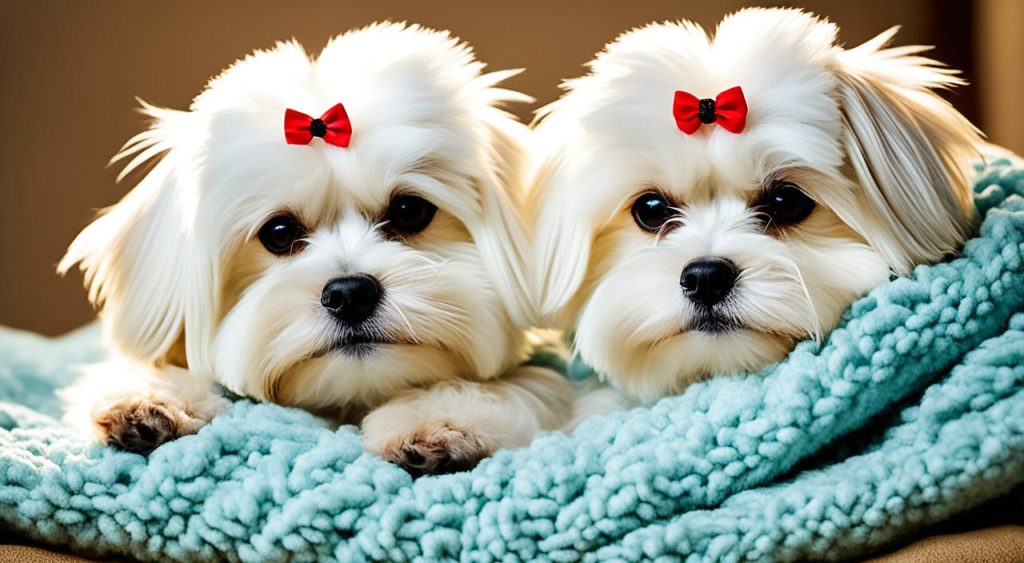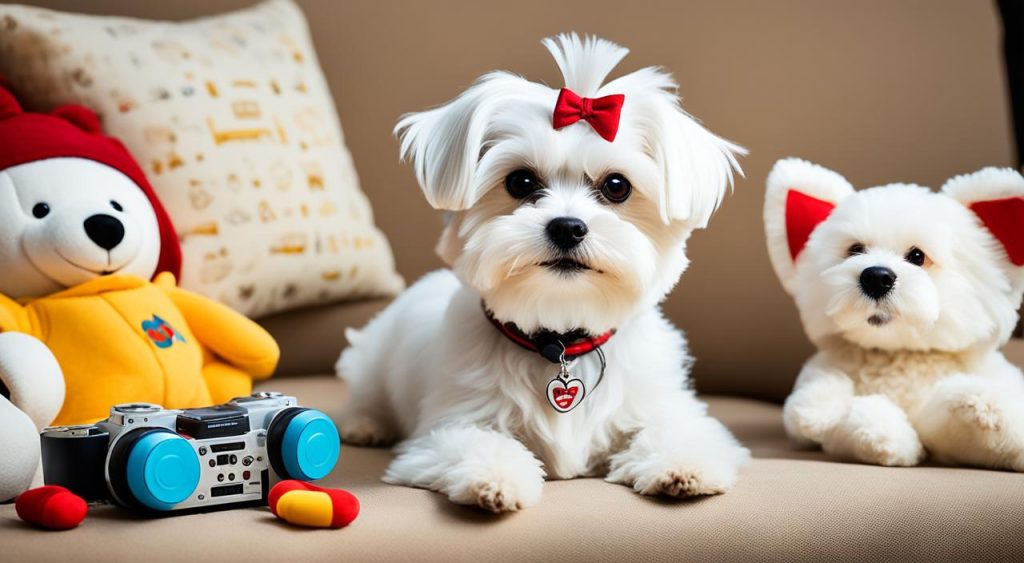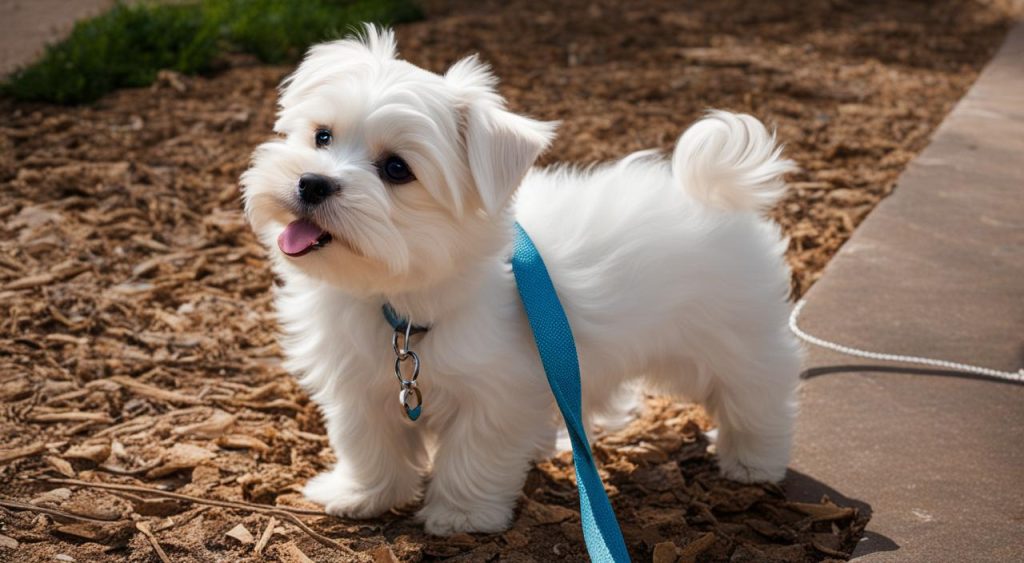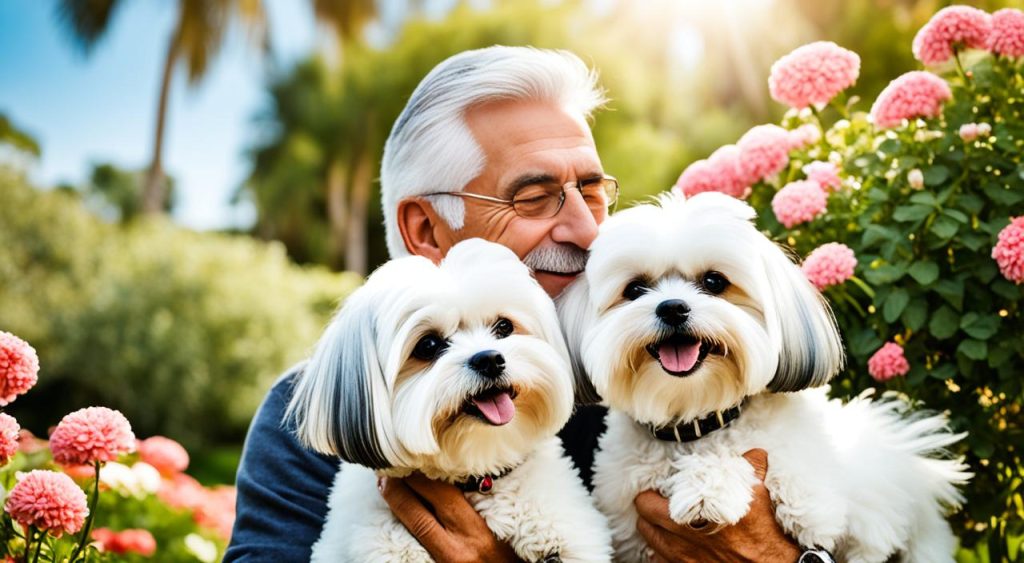The Maltese breed is known for its love of cuddling. These affectionate dogs have a natural affinity for cuddling with their owners. If you own a Maltese dog, you may have noticed their cuddly nature and their desire to be close to you. Let’s explore the reasons behind their cuddling behavior and how you can nurture this special bond.
Key Takeaways
- Maltese dogs are known for their love of cuddling and forming strong attachments to their owners.
- They enjoy cuddling for warmth and a sense of security.
- Maltese dogs have an affectionate temperament, which makes them seek closeness through cuddling.
- They thrive on attention and may develop separation anxiety if left alone for long periods.
- Caring for a Maltese includes providing them with the necessary care, attention, and affection they need.
Why Do Maltese Like to Cuddle?
Maltese dogs have a natural inclination for cuddling, and there are several reasons why they are drawn to this behavior. Firstly, Maltese dogs often seek warmth through cuddling. These small dogs have a low tolerance for colder temperatures, and curling up close to their owners provides them with the warmth and comfort they desire.
Another reason Maltese dogs love to cuddle is for protection. Despite their big personalities, their small size makes them vulnerable. By cuddling up against their owners, they feel safe and secure, knowing that their loved ones are there to provide them with warmth and protection.
Moreover, the Maltese temperament plays a significant role in their cuddling behavior. Maltese dogs are known for being affectionate and deeply attached to their owners. Cuddling allows them to express their love and form even stronger bonds with their human companions.
Cuddling is not only a physical expression of love for a Maltese dog but also a way for them to receive affection and attention. They adore being in close proximity to their owners and enjoy the feeling of closeness that cuddling brings.
In conclusion, Maltese dogs have a natural inclination for cuddling due to their desire for warmth, need for protection, and their affectionate temperament. Understanding and embracing their cuddling behavior is not only beneficial for their well-being but also strengthens the bond between Maltese dogs and their owners.
Do Maltese Like to Be Held and Hugged?
Maltese dogs are known for their affectionate nature and strong bond with their owners. They thoroughly enjoy being held and hugged, as it provides them with a sense of security and emotional closeness. Snuggling up to their human companion is one of their favorite activities, whether it’s on the couch, in bed, or simply sitting in their owner’s lap.
However, it is important to note that Maltese dogs can develop separation anxiety if left alone for extended periods. These loving creatures thrive on attention and may feel anxious or distressed without the presence of their beloved owner. To prevent separation anxiety, it’s crucial to provide them with the time and affection they crave.
When you hold and hug your Maltese, it reassures them of your love and strengthens the bond between you. The physical contact and closeness with their owner enhance feelings of security and happiness. So, whenever your Maltese seeks your attention, don’t hesitate to give them a warm hug or hold them close to your heart.
Remember, while Maltese dogs adore being held and hugged, it’s important to be sensitive to their needs and boundaries. Respect their body language and provide them with comfort and security without overwhelming them. With your love and care, your Maltese will thrive and flourish as an affectionate and cherished member of your family.
Caring for Your Maltese
Proper care is essential to ensure the well-being of your Maltese. These small and affectionate dogs require specific attention and maintenance to keep them healthy and happy.
1. High-Quality Small-Breed Formula: Feed your Maltese a high-quality small-breed formula dog food that meets their nutritional needs. Look for options specifically formulated for small dogs to ensure they receive the right balance of nutrients.
2. Regular Veterinary Appointments: Schedule regular check-ups with your veterinarian for preventive care and to address any health concerns. Maltese dogs are prone to certain health issues, so it’s important to have them screened and monitored by a professional.
3. Daily Grooming: Maltese dogs have a long, silky coat that requires regular grooming. Brush their coat daily to prevent matting and tangling. Consider taking your Maltese to a professional groomer for trimming and maintenance to keep their coat in top condition.
4. Address Separation Anxiety: Maltese dogs are known to experience separation anxiety when left alone for extended periods. To alleviate their distress, consider having a pet sitter or doggy daycare to keep them company while you’re away. Ensure they have toys and a comfortable space to stay in during your absence.
5. Travel Companions: Despite their small size, Maltese dogs make excellent travel companions. They are adaptable and can easily accompany you on trips, both short and long. However, ensure their safety and comfort by using a secure carrier or seat harness during car rides or flights.
Proper care for your Maltese includes providing them with a balanced diet, regular veterinary care, and daily grooming. Additionally, addressing separation anxiety and making them comfortable during travel ensures their overall well-being.
Maltese Dog Facts
Maltese dogs have a fascinating history and possess unique traits that make them a beloved breed. Let’s explore some interesting facts about these delightful dogs.
Origin and History
The Maltese breed originated in Malta, where they were cherished by nobility and often given as gifts to royals. Their lineage can be traced back thousands of years, making them one of the oldest toy breeds.
Hypoallergenic Coat
Maltese dogs are considered hypoallergenic, which means they are less likely to cause allergic reactions in people with sensitivities. Their silky and luxurious white coat sheds minimally, making them a suitable choice for individuals with allergies.
Picky Eaters
When it comes to mealtime, Maltese dogs can be picky eaters. They may have specific preferences when it comes to their food. Providing them with high-quality and nutritious meals is important to meet their dietary needs and keep them healthy.
Physical Traits
Maltese dogs have a compact and well-proportioned body. Their most notable feature is their stunning white coat, which hangs straight down and requires regular grooming to prevent matting. They have expressive eyes, a black-button nose, and long, flowing ears.
Personality and Temperament
Maltese dogs have a gentle, loving, and loyal personality. They thrive on companionship and enjoy being part of their human family. Their affectionate nature makes them excellent lap dogs and cuddle buddies.
Loyalty and Obedience
Maltese dogs are known for their loyalty and devotion to their owners. They form deep bonds and seek to please their human companions. With proper training and socialization, they can be obedient and eager to learn new commands.
Socialization
Socialization is crucial for Maltese dogs to ensure they develop into well-rounded and friendly pets. Exposing them to various environments, people, and other animals from a young age helps prevent any tendencies towards snappish behavior.
Grooming, Dental Care, Exercise, Nutrition, and Common Health Issues
Proper grooming plays a vital role in the overall well-being of your Maltese dogs. Regular brushing and trimming of their luxurious white coat not only keep them looking their best, but also prevent matting and tangling. To maintain their dental health, it’s important to incorporate dental care into their routine, such as regular teeth brushing or using dental chews recommended by your veterinarian.
Exercise is crucial for keeping your Maltese dogs healthy and happy. While they are not high-energy dogs, they still require daily moderate exercise to prevent obesity and maintain their physical and mental well-being. A daily walk or play session will suffice.
When it comes to nutrition, Maltese dogs require a balanced and nutritious diet tailored to their specific needs. Portion control is crucial to prevent overfeeding and obesity, as Maltese dogs are prone to weight gain. Consult with your veterinarian to determine the appropriate amount and type of food that best suits your Maltese.
While Maltese dogs are generally healthy, they are prone to certain health issues that owners should be aware of. These include reverse sneezing, collapsed trachea, white dog shaker syndrome, luxating patella, and progressive retinal atrophy. Regular veterinary checkups and preventive measures are essential in ensuring their overall health and addressing any potential issues promptly.
Conclusion
Maltese dogs are renowned for their unwavering love and affection towards their owners. Their innate cuddling behavior, coupled with their loving and loyal nature, fosters deep bonding between them and their human companions. By recognizing and embracing these displays of affection, you can nurture and strengthen the bond you share with your Maltese dog, transforming them into cherished members of your family.
From the moment you bring a Maltese dog into your life, their love and devotion are palpable. Their desire to curl up beside you, snuggle on the couch, or nestle under the covers demonstrates their deep need for closeness and connection. Through cuddling, Maltese dogs communicate their affection, trust, and reliance on their beloved owners.
The bond between Maltese dogs and their owners goes beyond physical touch. This breed thrives on close companionship, seeking human interaction and approval. By reciprocating their love and providing them with the attention and care they yearn for, you can further solidify the deep bond and mutual adoration between you and your Maltese companion.





